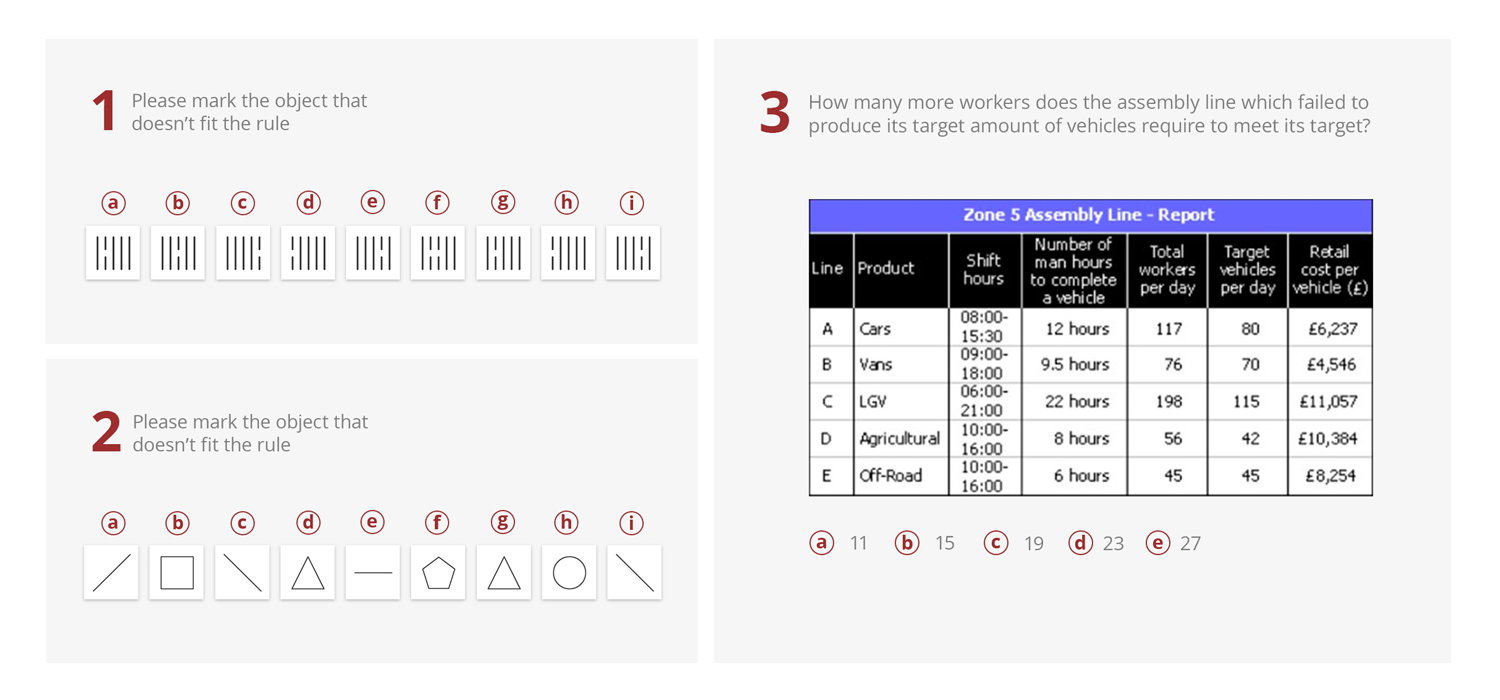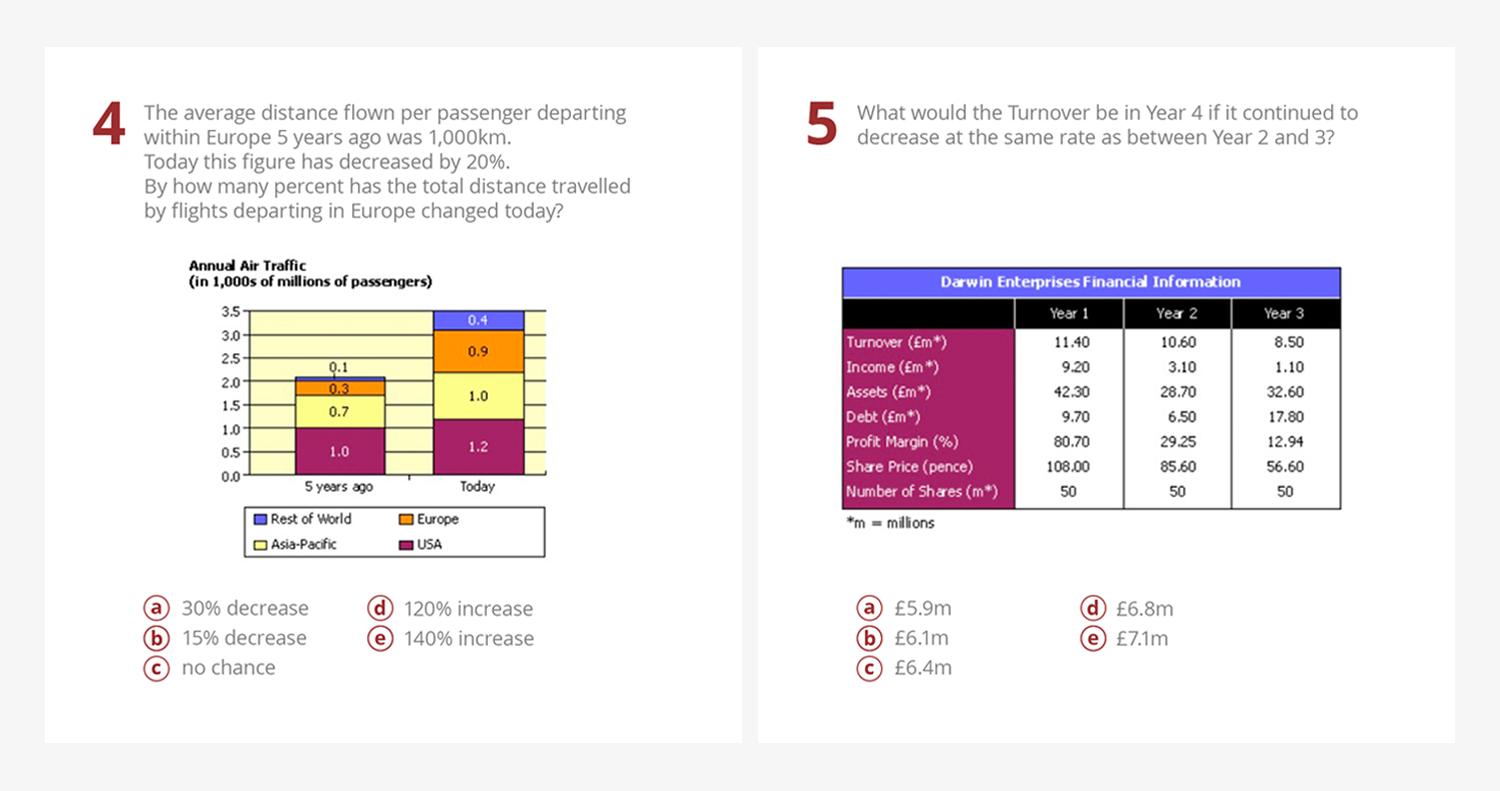You have an impeccable CV, getting interviews is a breeze, and the hiring manager loves you. But just as you thought the offer was a done deal, the company surprises you with another step in the hiring process — a psychometric test.
Don’t worry, we’ve got you covered with tips and tricks on how to succeed on a psychometric test.

Psychometric tests measure a candidate’s aptitude for the job, beyond what’s written on their CVs and diplomas. They ask a series of questions to assessintelligence, ability, potential, and personality. Many employers use psychometric tests as a kind of checkpoint to filter out unsuitable candidates.
Why do employers use psychometric tests?
As competition for top positions grows, top companies are looking for new ways to sift through the increasing number of qualified candidates. Employers use psychometric tests early on in the recruitment process to assess your potential and ability to think logically about new challenges.
In the UK, a common type of psychometric test will include multiple-choice questions on maths, language, and logical reasoning. These questions can assess how you:
- Draw conclusions, even in unusual situations
- Present your conclusions clearly and concisely
- Use the right arguments in a debate
- Think objectively about your work and correct mistakes
Logical thinking is useful in both work and daily life. Our brain deals with many tasks on a daily basis, so we need consistent and coherent reasoning to solve problems. This skill is particularly handy in jobs like consulting where you need to quickly analyse a lot of information.
Here is a sample question. Choose which of the symbols on the right is best suited for the “?” on the left.


Correct Answer
The first picture in the second row is the right answer. Why?
- Note whether the arrow moves clockwise or counterclockwise.
- Look at the arrow’s movement trajectory (rotation intervals).
- Check whether the arrow is inside or outside the pentagon and the sequence in which its position changes.
- Notice that not all of the suggested answers have a black dot in the middle of the pentagon.
Types of psychometric tests
There are over 5000 different types of psychometric tests used by many companies. Some use just one type of questions while others combine different areas, such as verbal reasoning and mathematics. Here are some of the most popular assessment tests in the UK and Europe.
Verbal reasoning
Verbal reasoning tests measure your understanding of language, grammar, and terminology as well as your ability to quickly interpret information.
A verbal reasoning test will often include a paragraph and some related questions. It may also test your grammar or spelling by giving you several options to choose from. Understanding complex terms through definitions is another type of verbal reasoning question. You might, for example, be shown a word and asked to find its antonym.
If the employer wants to assess your ability to interpret information and make decisions, they might include a text challenge with a lot of data and terms. You will then need to answer related scenario questions.
Numerical reasoning
Numerical reasoning tests are designed to see how well a person understands everything related to numbers: sequences, graphs, tables, and mathematical equations (see example 3 in the next section).
The tests are frequently used for administrative positions, but graduates or managers can also come across numerical reasoning tests. In advanced computational tests, you’ll need to process and interpret blocks of complex information.
Abstract thinking
Abstract thinking is considered one of the best indicators of mental flexibility and the ability to learn new things. In an abstract thinking test, you will usually be presented with some kind of pattern and you’ll need to deduce and continue its logic (see examples 1 and 2 in the next section).
Such tests are often used to select candidates for technical positions involving abstract ideas and concepts.
Spatial aptitude
Tests that evaluate spatial aptitude will ask you to visually assemble and disassemble spatially displaced objects. They test the ability to manipulate figures in two dimensions or visualise 3D objects from 2D images.
Spatial abilities are important for manufacturing, technical, and design positions that use plans and drawings. Examples include engineering, architecture, surveying, and design. They are also key for certain scientific careers.
General aptitude
General aptitude tests measure the analytical and deductive abilities of candidates. They assess your ability to learn even if you are not skilled in a particular subject or topic.
More often than not, a general test includes a mix of questions: numerical ability, drawing conclusions, reading comprehension, and recognising logical connections.
Examples of logic questions on psychometric tests
Let’s take a look at several real questions used by companies on psychometric tests. Typically, you’ll perform this test online; but in some rare cases, the company may repeat the process in person to check that you have completed the test honestly and independently.


Below are some “brain teasers”. They are used both during job interviews and at assessment centres. Here, you want to not only give an answer but also explain the reasoning behind your conclusions. Even if you don’t get it right, make sure to provide the logic behind your process.


Advanced Logic Tests
Compose a figure: You are presented with a complete figure as well as its separate pieces. You need to compose the final image using these pieces. It might sound simple, but you’re given very little time for this task.

Choose the correct answer: You see several equations pop up on the screen. Below is the target answer. You must quickly choose the equation that’ll give you this answer.

Tetris: Similar to Tetris, you need to combine different shapes into one larger figure. There is a strict time limit.

Tips to prepare for psychometric tests
1. Do your research
To prepare for a psychometric test, find out which test provider the company you are interviewing with uses. Some of the most popular providers in England — SHL and Kenexa — put practice questions on their official websites.
Then, figure out exactly what type of test you’ll be taking. Sometimes, companies may use their own nomenclature for tests, so it’s a good idea to ask the recruiter or hiring manager to clarify these details.
If you received an automated invitation to complete the test, you can try reaching HR via their generic email. In any case, make sure to prepare a calculator, some paper, and a pen or pencil in case you need them during the test.
2. Don’t panic
Anxiety can hinder your chances of successfully completing the psychometric test. Lots of practice is bound to increase your confidence.
“One pro tip is that large companies often use the same test providers. For example, PwC and Vodafone both use SHL. Let’s imagine that your dream job is at PwC. You can start a recruitment process with Vodafone to try out the test before completing the one for your desired position. Even if the test is not identical, it will help you hone your skills.”
Andre Atallah, corporate career consultant. Speak to Andre
You can also access some free psychometric test resources here:
- https://www.assessmentday.co.uk/logic/free/LogicalReasoningTest1/
- https://www.testpartnership.com/free/inductive/1/
- https://www.psychometricinstitute.com.au/Free-Aptitude-Tests.asp
- https://www.assessment-training.com/logical-reasoning-test
If you still lack confidence, you can try some paid resources like Graduate Monkey or Job Test Prep or speak to our expert Andre Atallah to see if he can train you.
Finally, remember that this is just one stage in the hiring process. Even if you didn’t get a perfect result on a psychometric test, it might not be the end of the journey for you – simply prepare well, do your best on the day and aim for a below-average result to be invited to the next stage.
3. Practice with a friend
Even with lots of practice, you might find that it’s difficult to understand the logic behind some questions. Try finding friends in your circle who have a different skill set from yours. They can help you practise for psychometric tests and bounce ideas.
For example, if your friend excels at logic questions, ask them to explain their thought process so that you can get an insight into how their brain works. There are also other peer resources for psychometric tests, like forums and online groups.
Remember though that it’s not a good idea to have your friend help you complete the test online. Some companies will have you redo the test on-site with other questions. It would be disappointing and embarrassing if you were to fail the onsite test.
4. Focus on your strengths
Statistically, very few people can boast equally developed mathematical, verbal, and logical skills. For example, maths geniuses often fail a popular personality test administered by many UK companies.
So don’t worry if you are not doing well on one aspect of the test. Keep working on your strengths, and pay particular attention to your weaknesses.
Even though many believe that logical thinking is an innate ability, it can actually be developed. Some universities even offer it as a subject. But if you weren’t lucky enough to take logic classes at school, try fun tools like Sudoku and online IQ tests to train your thought process.
Now that you know how to prepare for a psychometric test, the questions shouldn’t take you by surprise. Plus, all the time you spend learning will be well worth it — even if you simply develop and grow your logical thinking skills.
How we can help you prepare for psychometric tests and land that job
EP Advisory helps job seekers throughout the hiring process at large global companies in the UK and elsewhere. We offer services that range from CV writing to preparation for every stage of the interview process. Our advisors help you along every step of the way, so you can land that dream job anywhere in the world.
Already in but need help with psychometric tests? Book a 60-minute consultation or a full-support career package with Andre Atalla, who’ll coach you on passing psychometric tests with a top score. Andre has worked with top global brands like Allianz and has extensive experience in completing corporate assessment tests.



